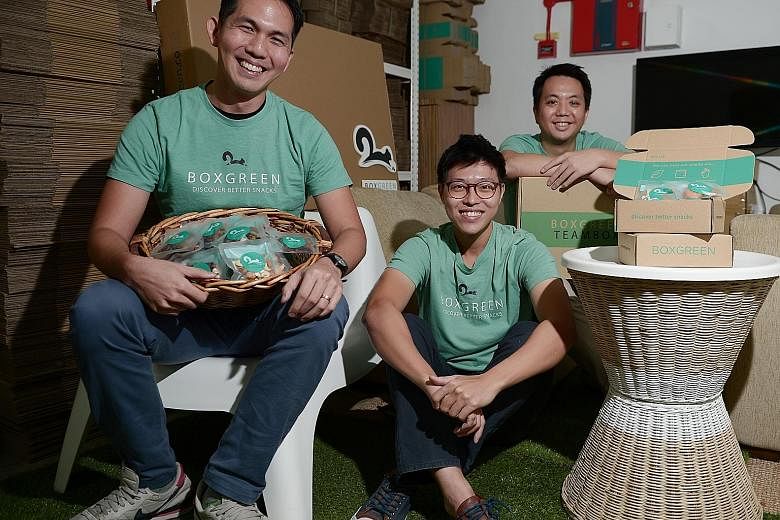Q How did BoxGreen start?
Mr Oh It all began in 2014, when Andrew and I were management associates at DBS Bank, working long hours. At night, shops would be closed and we had to rely on vending machines selling sugared peanuts and chocolate bars.
We started toying with the idea of having a service that would deliver snacks to people regularly. We had no products, just the concept. But we started telling our colleagues about it and before we knew it, 30 people actually said they were keen and started giving us money.
So we scrambled, went to FairPrice to search for healthy snacks, bought some and shipped them out to our subscribers.
It grew from there. We would work in the day, shop for snacks after work and go to the post office at midnight to drop our packages off in the mailbox.
Along the way we started questioning ourselves - how did we add value? These were snacks that people could buy themselves.
Furthermore, we were starting to receive queries from customers asking for specific types of snacks. For example, we had a food vendor that caters to hospitals that asked us to come up with low-sodium or zero-sodium snacks.
So we began customising snacks and decided to build our own brand.
Q It is quite a big leap, to leave stable corporate jobs to create your own start-up. What gave you the courage?
Mr Oh We all came on board full time between September 2014 and May 2015. I was the first to quit my job and work full time on BoxGreen.
I thought it was an adventure worth embarking on. After all, we already had customers and we were profitable from the start.
Mr Lim The idea of building something that was ours and not just running someone else's agenda was very appealing to me. And this has been like an intense, hands-on two-year MBA course.
I don't think we could have gained the kind of learning and experience that we've had these past two years in the corporate world.
Mr Wong I had worked for start-ups before, in Malaysia, Australia and here, but I always felt like I could stretch my skills more. So I joined BoxGreen, to build their backend tech capabilities from scratch.
Q How do you produce the snacks that you offer today?
Mr Oh We have our own kitchen where we conduct experiments. We have a nutritionist who ensures that the health claims on our snack packages are backed up by science.
We like to create localised snacks. For example, we have a snack called cheng tng, which comprises baked lotus seeds with goji berries and dried longan, and we have a snack comprising laksa-flavoured nuts.
Q How do the challenges of running a food tech start-up differ from those of a traditional food and beverage firm?
Mr Lim We manage a constantly changing pantry of snacks. Some snacks that we put out just aren't popular and so we take them out, tweak the recipe, and we keep adding new snacks every month.
Mr Oh Now we have close to 50 products on offer, and each customer gets to choose four to go into their box. That makes 50,000 possible combinations. But the technology is there to help. We can use technology to predict our inventory and order in a smart way so that our supplies come in fresh and our products go out fresh.
Mr Wong We also have algorithms to tell us more about our customers' preferences. Based on that, we can figure out what a particular user likes so that we can recommend them snacks we think they'll like.
We get a lot of data and it can be challenging to make sense of it all, even just to figure out which data is meaningful and which is not.
Mr Lim We experiment a lot. The beautiful thing is that we could come up with an idea this week, produce it within the week, launch it next week and get feedback immediately. So even if it fails, at least we hadn't spent six months on research and development.
Q What are your plans?
Mr Oh We want to take on additional funding to grow our business in Malaysia, where we launched in June. We are seeing traction. We'd also like to enter markets such as Hong Kong, Thailand and Indonesia.
We are going to talk to investors at the end of this month. We hope to raise US$2-3 million (S$2.7 - S$4 million) this time around.
In terms of technology, we'd like to beef up our analytics to better serve our products team. We also want to improve the ordering system so it'll be easier for customers to use.


